Open Doors to Opportunities: Mastering the Art of 28 Research Reference Letter Templates
Welcome to our website dedicated to Research Reference Letters! Whether you are a student, researcher, or professional seeking to showcase your qualifications and accomplishments, we are here to assist you in crafting impactful and persuasive reference letters. Our platform provides a wealth of resources, including guidelines, templates, and writing tips, to help you navigate the process with confidence. We understand the importance of research reference letters in presenting a strong case for your academic pursuits, career advancements, or grant applications. With our expertise and support, you can create compelling letters that highlight your abilities, skills, and potential. Start exploring our website and unlock the power of effective reference letters to open doors to exciting opportunities.
Guidelines and Tips
- Start Early: Begin the process of requesting research reference letters well in advance to allow sufficient time for the referees to write and submit the letters. Ideally, give them at least 4-6 weeks’ notice.
- Choose the Right Referees: Select referees who are familiar with your work and can speak to your qualifications, skills, and accomplishments in the specific research area. Consider professors, research supervisors, or industry professionals who can provide informed and credible recommendations.
- Personal Connection: Prioritize referees with whom you have developed a personal connection or worked closely. They will be able to provide more detailed and personalized insights into your research abilities and potential.
- Requesting a Letter: When approaching potential referees, be polite and professional. Clearly explain the purpose of the letter, why you have chosen them as a referee, and how their recommendation will contribute to your academic or professional pursuits.
- Provide Relevant Information: Supply your referees with the necessary information to write a strong and tailored letter. This may include your CV or resume, research statement, academic transcripts, and any specific guidelines or requirements provided by the institution or organization you are applying to.
- Share Research Highlights: Highlight your notable projects, achievements, and contributions to the field. Provide specific examples that demonstrate your skills, methodology, and outcomes.
- Follow-Up and Reminders: After requesting a letter, send a follow-up email to confirm the referee’s willingness to write the letter and provide any additional details or materials if needed. Send polite reminders as the deadline approaches to ensure the letter is submitted on time.
- Express Gratitude: Once the letter has been submitted, express your gratitude to the referee for taking the time and effort to write the letter. A sincere thank-you note or email can strengthen your professional relationship and leave a positive impression.
Privacy and Confidentiality
- Privacy Policy:
- Clearly state that you are committed to protecting the privacy and personal information of your users.
- Specify the types of personal information you collect, such as names, contact details, and any other relevant details necessary for providing research reference letter services.
- Explain how you collect, store, and use this information, ensuring compliance with applicable data protection laws and regulations.
- Clarify that you do not share or sell personal information to third parties without explicit consent, except as required by law or with the user’s permission.
- Confidentiality:
- Emphasize that all research reference letters and the information shared within them will be treated as confidential and handled with utmost care.
- State that the content of the letters, as well as any supporting documents provided, will be kept strictly confidential and will not be disclosed to unauthorized individuals.
- Highlight that the letters will only be shared with the intended recipients, such as academic institutions, employers, or other authorized parties, as directed by the user.
- Explain that you take appropriate technical and organizational measures to safeguard the confidentiality and security of the information collected.
- Data Security:
- Detail the security measures in place to protect the personal information and research reference letters stored on your website or database.
- Mention the use of encryption, secure server connections, and firewalls to protect against unauthorized access or data breaches.
- Specify that access to personal information and research letters is restricted to authorized personnel only, with appropriate user access controls and confidentiality agreements in place.
- Inform users of their rights regarding their personal information, such as the ability to access, update, or delete their data upon request.
- Compliance:
- Assure users that you comply with applicable data protection and privacy laws, such as the General Data Protection Regulation (GDPR) or relevant local regulations.
- Provide contact information for users to reach out if they have any questions, concerns, or requests regarding their privacy or the handling of their personal information.
- Include a disclaimer stating that while you take reasonable measures to protect user data, no method of transmission or storage is 100% secure and cannot be guaranteed.
#1: Academic Research Recommendation
An academic research recommendation letter is a document that serves to endorse and support an individual’s qualifications and capabilities in the context of academic research. It is typically written by a professor, mentor, or supervisor who has had direct experience with the candidate’s work. The purpose of this letter is to provide an objective assessment of the candidate’s abilities, academic achievements, and potential for future success in the field. It highlights the candidate’s skills, intellectual curiosity, analytical thinking, and ability to contribute meaningfully to the academic community through their endeavors.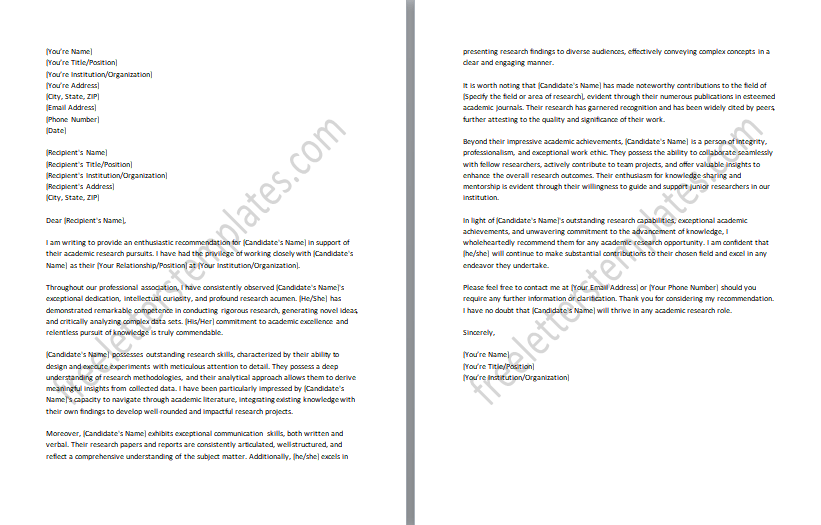
#2: Industry Research Endorsement
An industry research endorsement letter is a document that aims to validate and support an individual’s qualifications and expertise in conducting research within an industry setting. It is typically written by a supervisor, colleague, or professional contact who has observed and recognized the candidate’s exceptional abilities and contributions to the industry. The purpose of this letter is to highlight the candidate’s proficiency in designing and executing projects, their ability to generate valuable insights and findings, and their impact on the industry. The endorsement letter serves as a persuasive tool for employers, business partners, or industry organizations, enabling them to make informed decisions regarding the candidate’s suitability for focused positions or collaborations within the industry.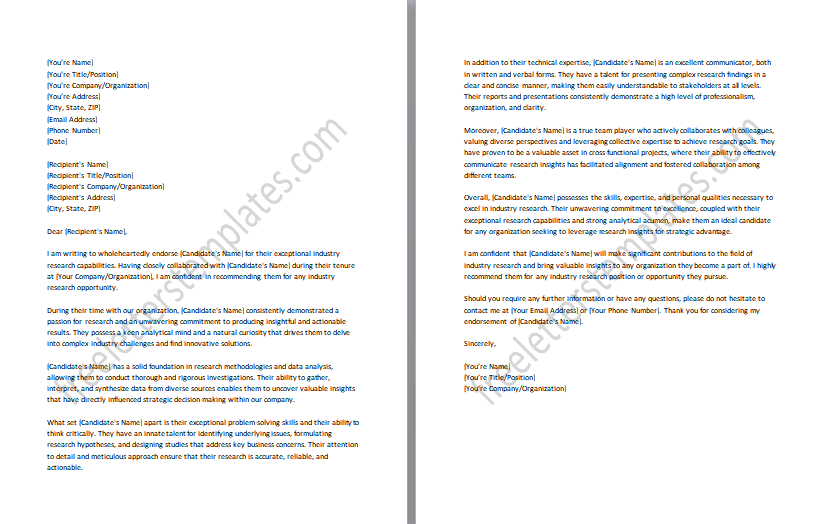
#3: Scientific Research Commendation
A scientific research commendation letter recognizes an individual’s outstanding contributions to scientific research. It is written by a respected scientist, advisor, or colleague to commend the candidate’s remarkable achievements and impact in their field. This letter acknowledges the candidate’s rigorous scientific methodology, innovative approaches, and significant publications. It emphasizes their critical thinking, hypothesis formulation, and ability to push the boundaries of knowledge. The commendation letter serves as a testament to the candidate’s intellectual curiosity, dedication, and potential to shape the future of science. It enhances their professional reputation and credibility, garnering recognition within the scientific community for their exemplary work.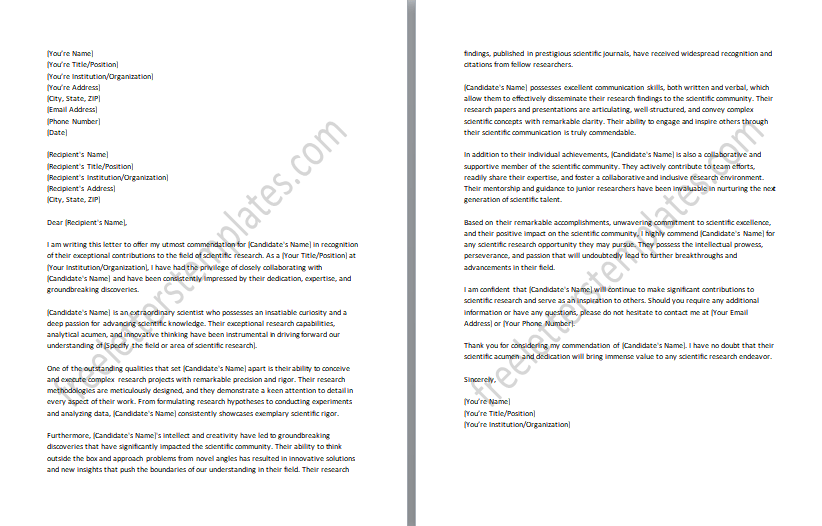
#4: Medical Research Support
A medical research support letter is a document that provides endorsement and backing for an individual’s involvement. It is typically written by a medical professional, supervisor, or mentor who can attest to the candidate’s aptitude and contributions to the field of medical research. The purpose of this letter is to express support for the candidate’s endeavors, highlighting their knowledge, skills, and dedication to advancing medical knowledge and improving patient outcomes. It serves as a valuable asset when seeking grants, funding, or academic positions in medical research, as it demonstrates the candidate’s credibility and potential for making significant contributions to medical science.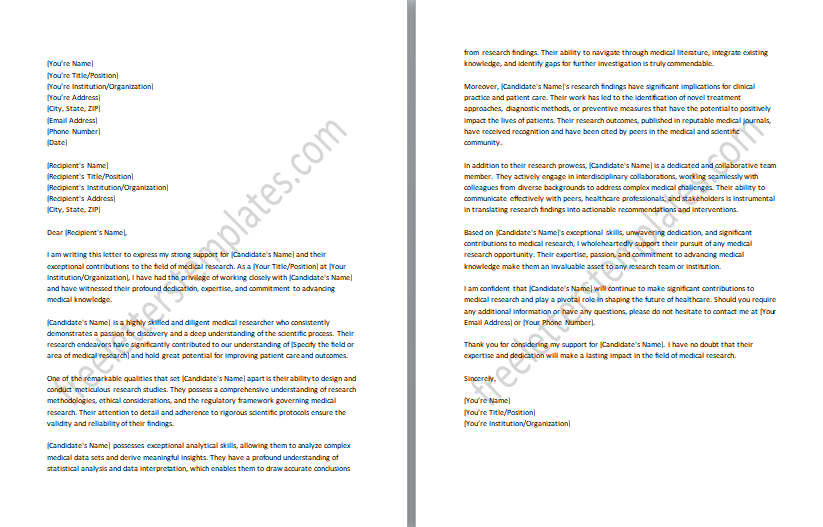
#5: Engineering Research Testimonial
An engineering research testimonial letter is a document that provides a testimonial or recommendation for an individual’s expertise and contributions in the field of engineering research. It is typically written by a senior engineer, advisor, or respected colleague who has witnessed the candidate’s outstanding performance and achievements in engineering projects. The purpose of this letter is to highlight the candidate’s technical skills, problem-solving abilities, methodology proficiency, and innovative thinking in the realm of engineering research. It emphasizes their track record of successful projects, impactful publications, and their ability to apply engineering principles to real-world challenges. The testimonial letter serves as a powerful endorsement, providing evidence of the candidate’s excellence and suitability for positions, academic roles, or industry collaborations within the field of engineering.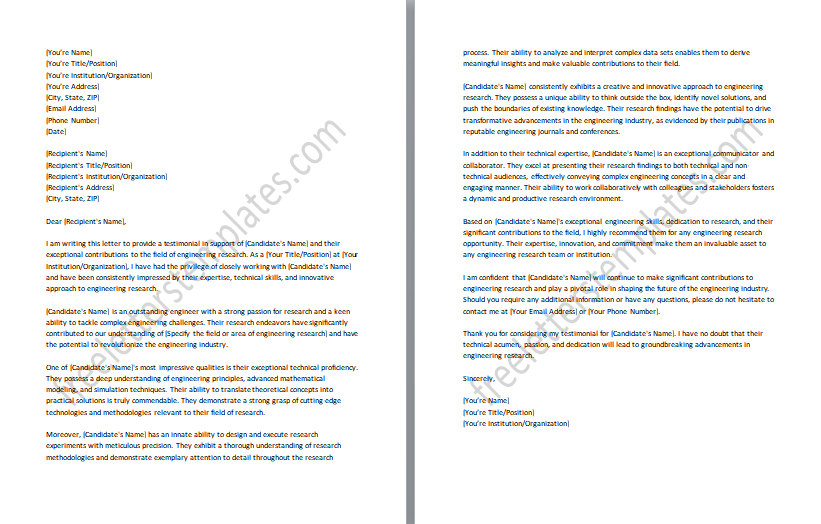
#6: Social Science Research Recommendation
A social science research recommendation letter is a document that provides a strong endorsement and support for an individual’s capabilities and accomplishments in the field of social science research. It is typically written by a professor, supervisor, or mentor who has had direct experience with the candidate’s work and academic performance in the social sciences. The purpose of this letter is to highlight the candidate’s expertise in social science methodologies, data analysis, and their ability to generate meaningful insights and findings. It emphasizes their critical thinking, theoretical knowledge, and their capacity to address complex social issues through rigorous research.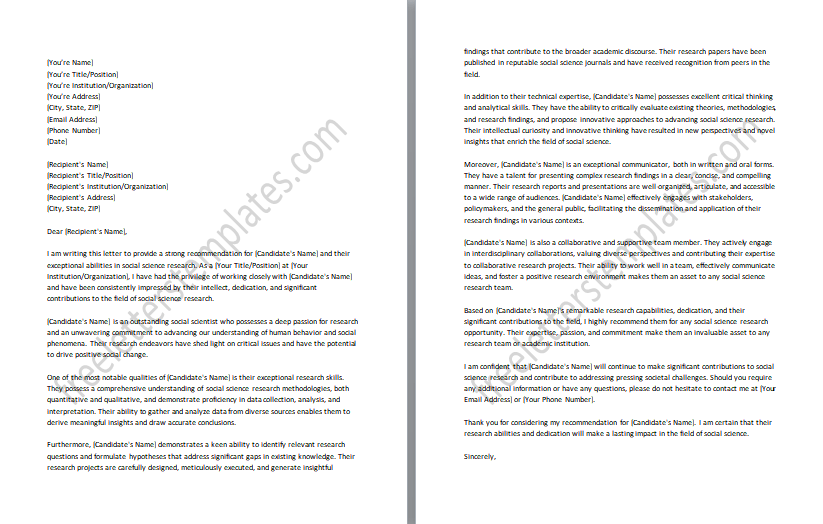
#7: Market Research Endorsement
A market research endorsement letter validates and supports an individual’s expertise in market research. It is written by a supervisor, client, or industry professional who has witnessed their exceptional capabilities. The letter endorses their proficiency in designing and executing projects, analyzing market trends, and providing valuable insights. It highlights their ability to collect and interpret data and deliver actionable recommendations for business growth. This endorsement enhances their credibility and reputation in the industry and is valuable for employment opportunities and collaborations requiring reliable market expertise.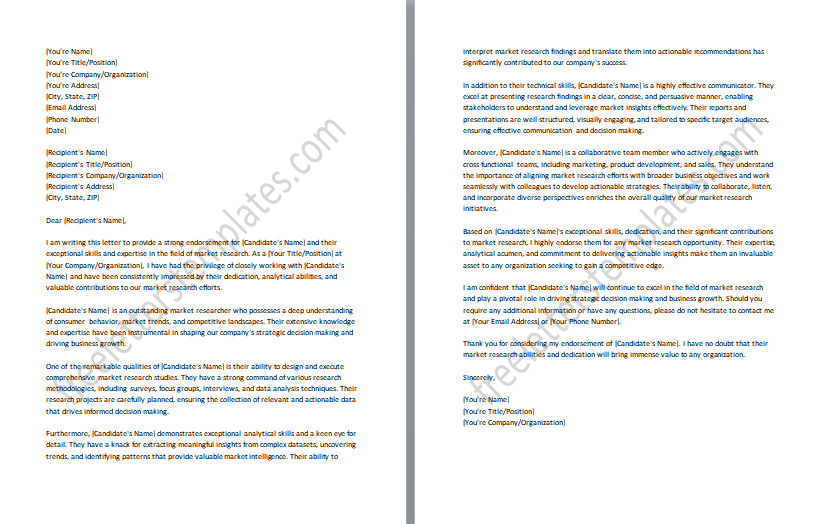
#8: Policy Research Reference
A policy research reference letter provides support for an individual’s expertise in policy research. It validates their skills in analyzing complex policy issues, conducting, and proposing effective solutions. The letter emphasizes their ability to gather and evaluate data, interpret findings, and communicate recommendations. It highlights their track record of delivering valuable insights for policy development and decision-making. This reference letter enhances their credibility in the field and is valuable for academic positions, think tanks, and policy-focused organizations. It showcases their competence in contributing to evidence-based policymaking and their potential for shaping effective policies.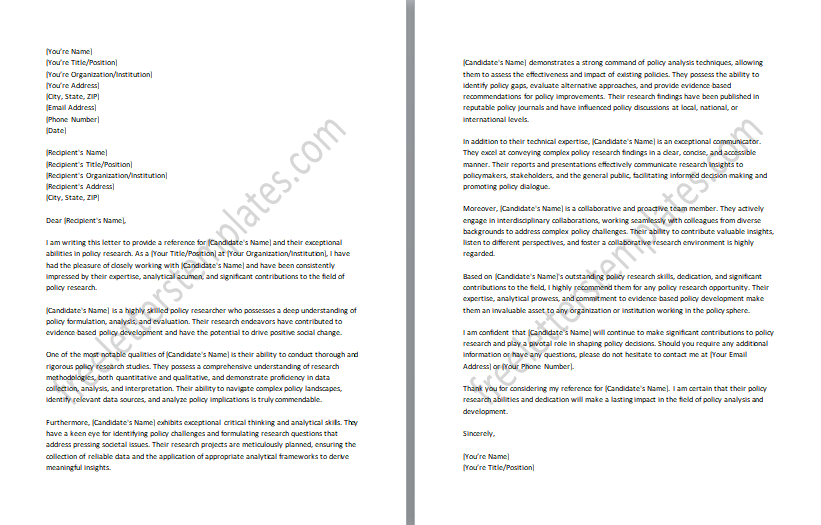
#9: Environmental Research Support
An environmental research support letter is a document that provides endorsement and backing for an individual’s involvement and expertise in environmental research. It emphasizes their dedication to studying and addressing environmental issues. The letter highlights their skills in conducting collecting and analyzing data and interpreting findings related to environmental challenges. It emphasizes their commitment to sustainability, conservation, and finding innovative solutions. This support letter showcases their contributions to the field, their potential for making a positive impact, and their suitability for academic positions, grants, or collaborations in the realm of environmental research.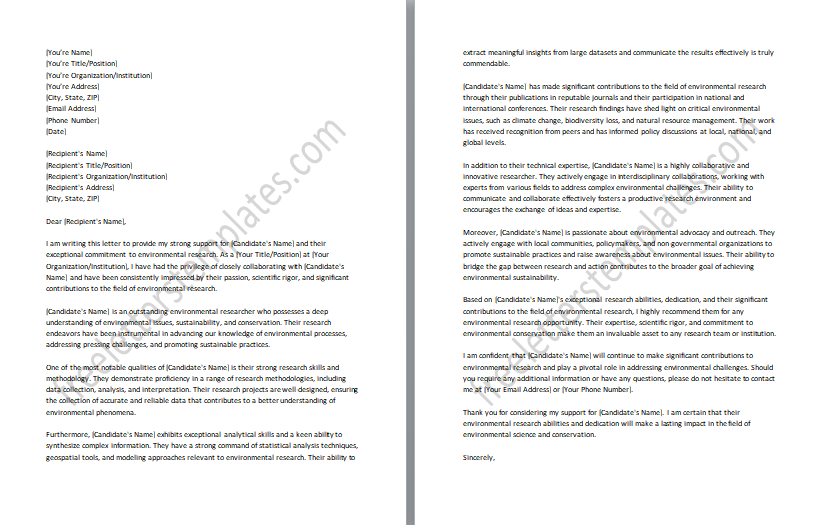
#10: Legal Research Recommendation
A legal research recommendation letter is a document that supports and recommends an individual’s capabilities and achievements in the field of legal research. It highlights their expertise in conducting thorough legal research, analyzing complex legal issues, and providing sound legal opinions. The letter emphasizes their ability to navigate legal databases, locate relevant case law and statutes, and interpret legal principles effectively. It showcases their strong analytical skills, attention to detail, and capacity to synthesize complex legal information into coherent arguments. This recommendation letter serves as evidence of their competence in legal and can significantly enhance their credibility when applying for legal positions, academic opportunities, or grants in the legal field.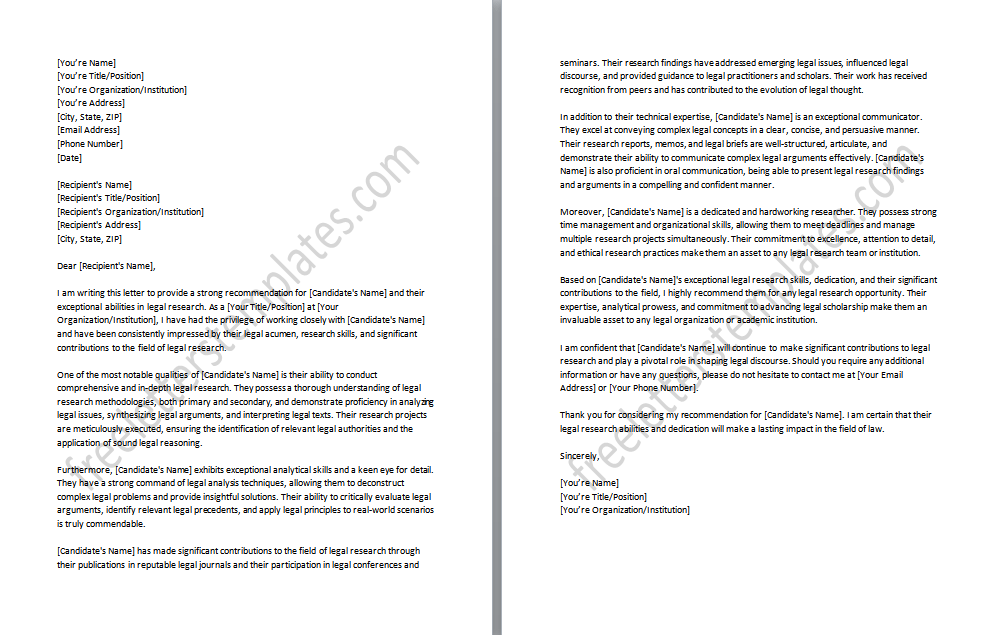
#11: Educational Research Endorsement
An educational research endorsement letter provides support and validation for an individual’s expertise and contributions in the field of educational research. It emphasizes their skills in designing studies, collecting and analyzing data, and drawing meaningful conclusions in the context of education. The letter highlights their ability to address educational challenges, propose innovative solutions, and contribute to evidence-based practices in education. It showcases their commitment to improving teaching and learning outcomes and their potential for influencing educational policies and practices.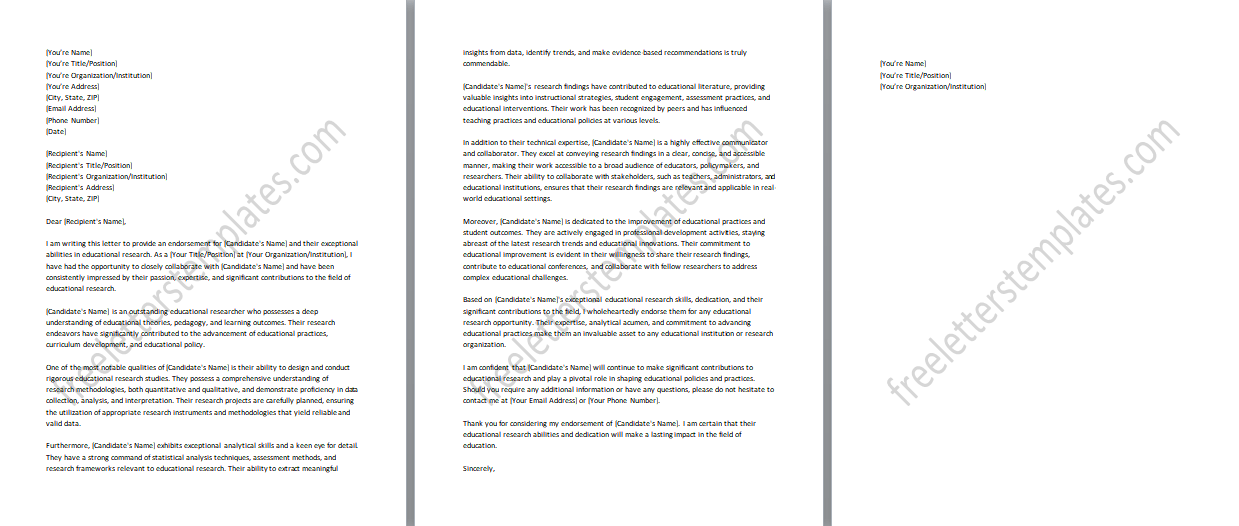
#12: Computer Science Research Reference
A computer science research reference letter validates and supports an individual’s expertise and accomplishments in the field of computer science research. It highlights their proficiency in conducting developing innovative algorithms and making significant contributions to the field. It showcases their track record of publications, presentations, and collaborations within the computer science community. This reference letter is valuable for academic positions, grants, or industry opportunities in computer science as it demonstrates the candidate’s credibility and potential for advancing knowledge and technology in the field.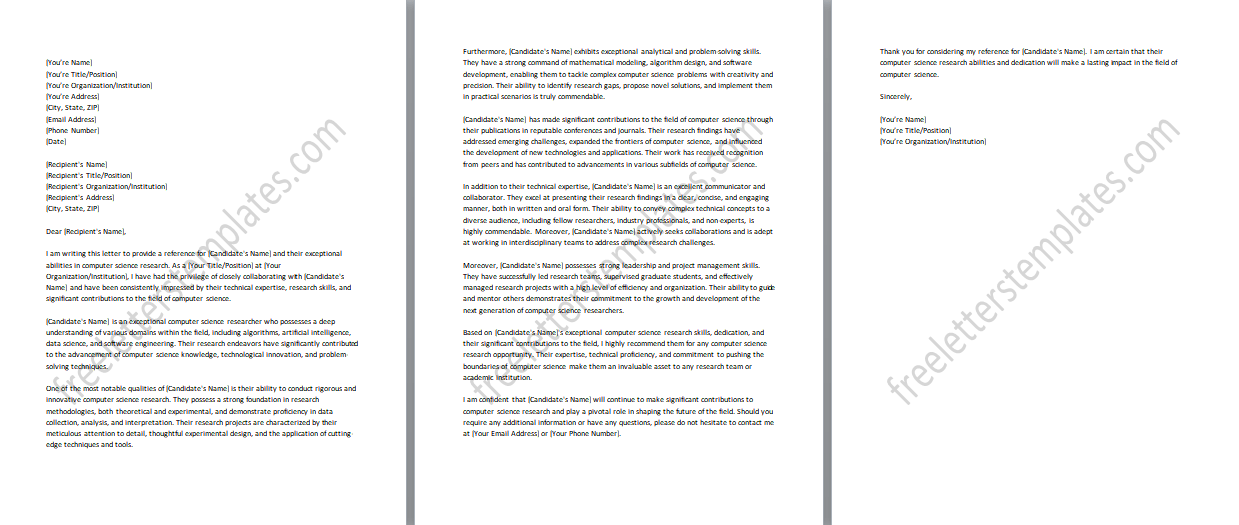
#13: Archaeological Research Recommendation
An archaeological research recommendation letter provides endorsement and support for an individual’s expertise and contributions in the field of archaeological research. It highlights their skills in conducting excavations, analyzing artifacts, and interpreting historical contexts. The letter emphasizes their ability to formulate questions, design fieldwork strategies, and employ advanced archaeological methods and techniques. It showcases their knowledge of archaeological theories and their ability to contribute to the understanding of past civilizations. This recommendation letter serves as evidence of their competence in archaeology and can significantly enhance their credibility when applying for academic positions, grants, or collaborations in the field of archaeology.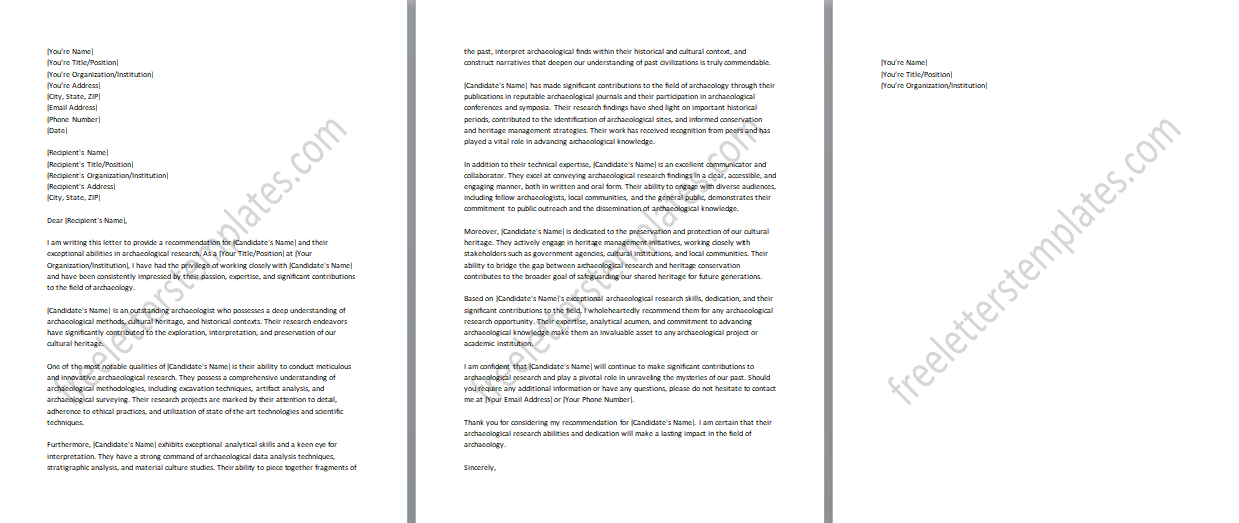
#14: Linguistic Research Endorsement
A linguistic research endorsement letter provides validation and support for an individual’s expertise and contributions in the field of linguistic research. It emphasizes their skills in studying language structures, analyzing linguistic data, and uncovering patterns and relationships. The letter highlights their ability to conduct thorough literature reviews, design experiments, and analyze language samples using advanced linguistic methodologies. This endorsement letter serves as evidence of their competence in linguistics and can significantly enhance their credibility when applying for academic positions, grants, or collaborations in the field of linguistics.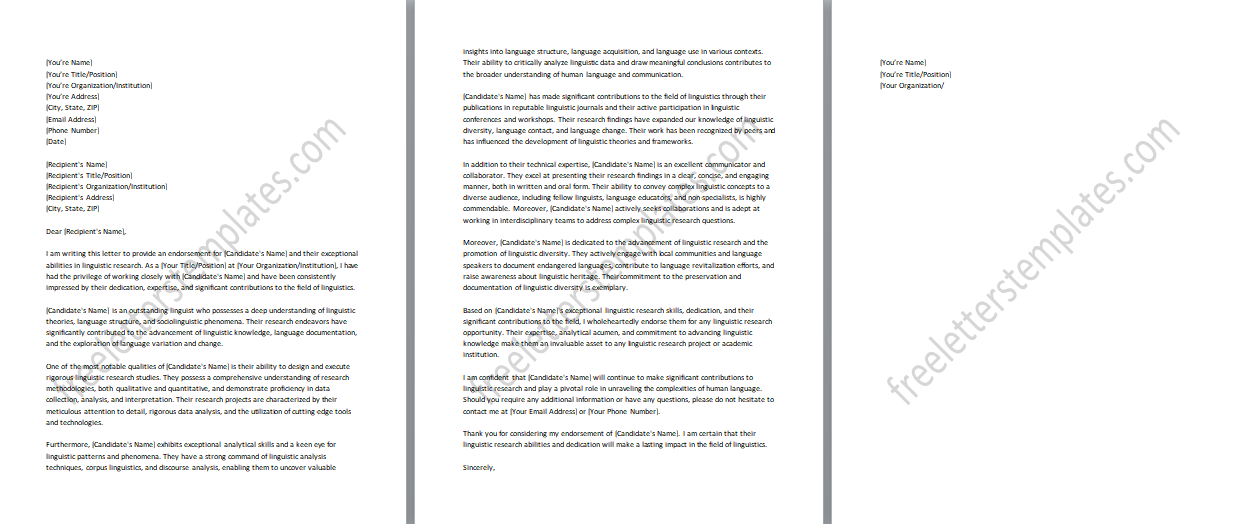
#15: Cultural Research Reference
A cultural research reference letter provides validation and support for an individual’s expertise and contributions in the field of cultural research. It emphasizes their skills in studying cultural practices, beliefs, and societal norms. The letter highlights their ability to conduct in-depth qualitative and quantitative, analyze cultural phenomena, and interpret their significance within specific contexts. It showcases their knowledge of cultural theories, their proficiency in conducting ethnographic fieldwork, and their ability to generate valuable insights into cultural dynamics. This reference letter serves as evidence of their competence in culture and can significantly enhance their credibility when applying for academic positions, grants, or collaborations in the field of cultural studies or anthropology.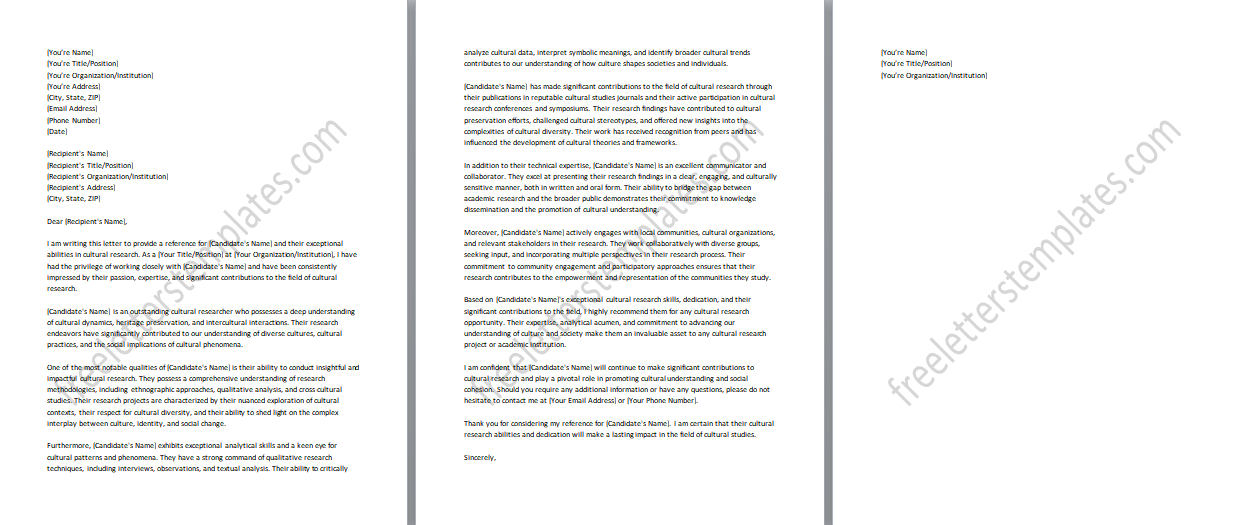
#16: Historical Research Commendation
A historical research commendation letter recognizes and praises an individual’s exceptional achievements and contributions in the field of historical research. It highlights their skills in conducting rigorous analyzing primary and secondary sources and constructing compelling historical narratives. The letter emphasizes their ability to critically evaluate historical evidence, synthesize complex information, and make significant scholarly contributions. This commendation letter serves as a testament to their outstanding work in history and acknowledges their potential for shaping our understanding of the past.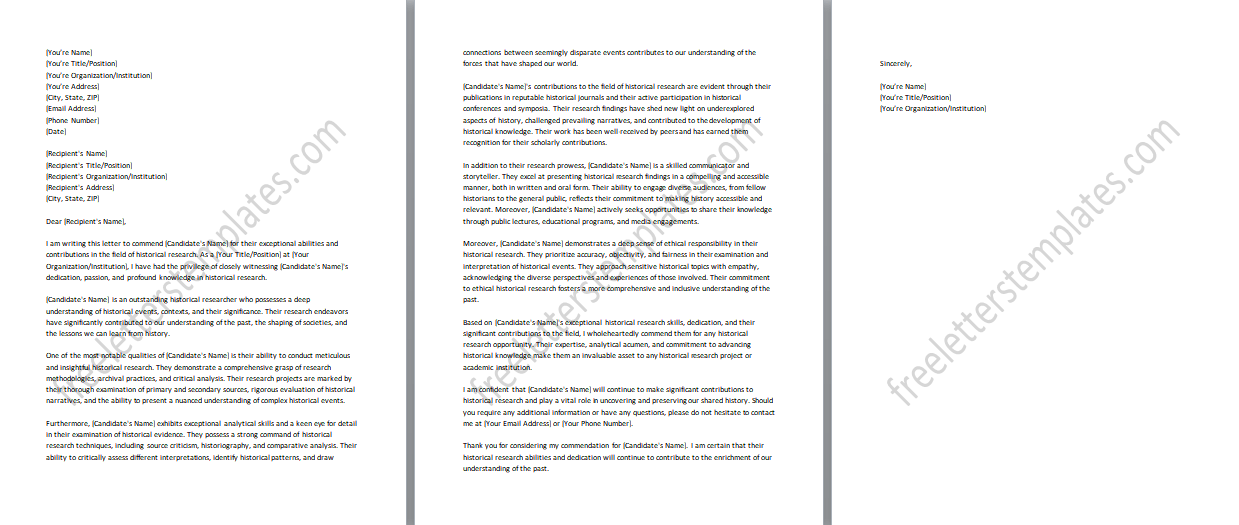
#17: Biomedical Research Support
A biomedical research support letter provides endorsement and backing for an individual’s involvement and expertise in biomedical research. It emphasizes their skills in conducting experiments, analyzing data, and interpreting findings in the context of biomedical science. The letter highlights their commitment to advancing medical knowledge, improving patient care, and finding innovative solutions to healthcare challenges. It showcases their ability to design studies, navigate ethical considerations, and contribute to the development of new diagnostics, therapies, or medical technologies. This support letter serves as evidence of their competence in biomedical and can significantly enhance their credibility when applying for grants, academic positions, or collaborations in the field of biomedicine.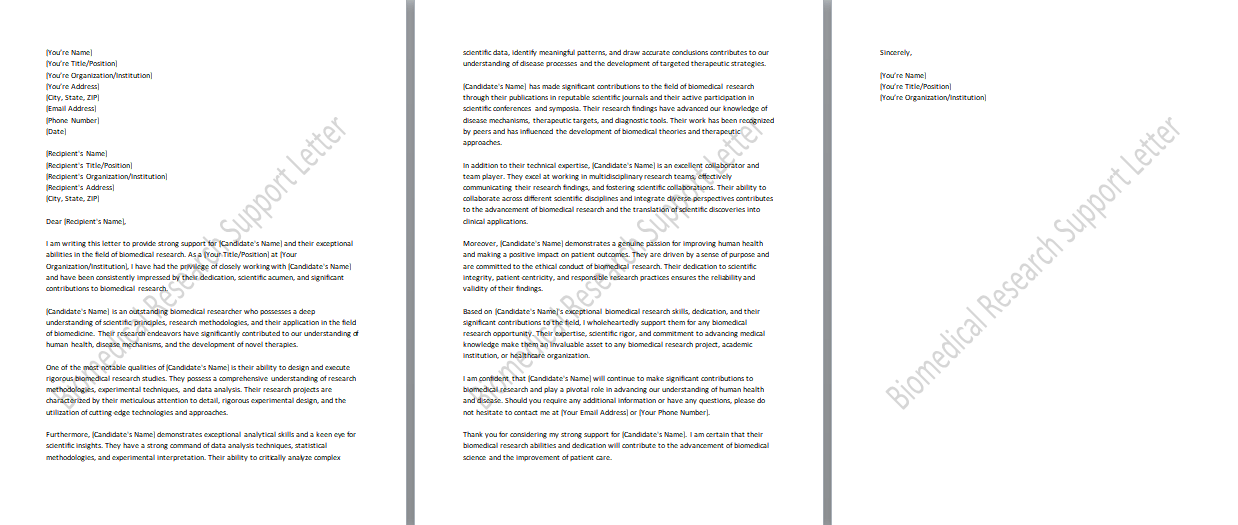
#18: Mathematical Research Recommendation
A mathematical research recommendation letter provides a strong endorsement and support for an individual’s expertise and contributions in the field of mathematical research. It highlights their skills in formulating and solving complex mathematical problems, developing new mathematical theories, and making significant advancements in the field. The letter emphasizes their ability to apply rigorous mathematical reasoning, utilize advanced mathematical techniques, and communicate their findings effectively. It showcases their track record of publications, conference presentations, and collaborations within the mathematical community. This recommendation letter serves as evidence of their competence in mathematics and can significantly enhance their credibility when applying for academic positions, grants, or collaborations in the field of mathematics.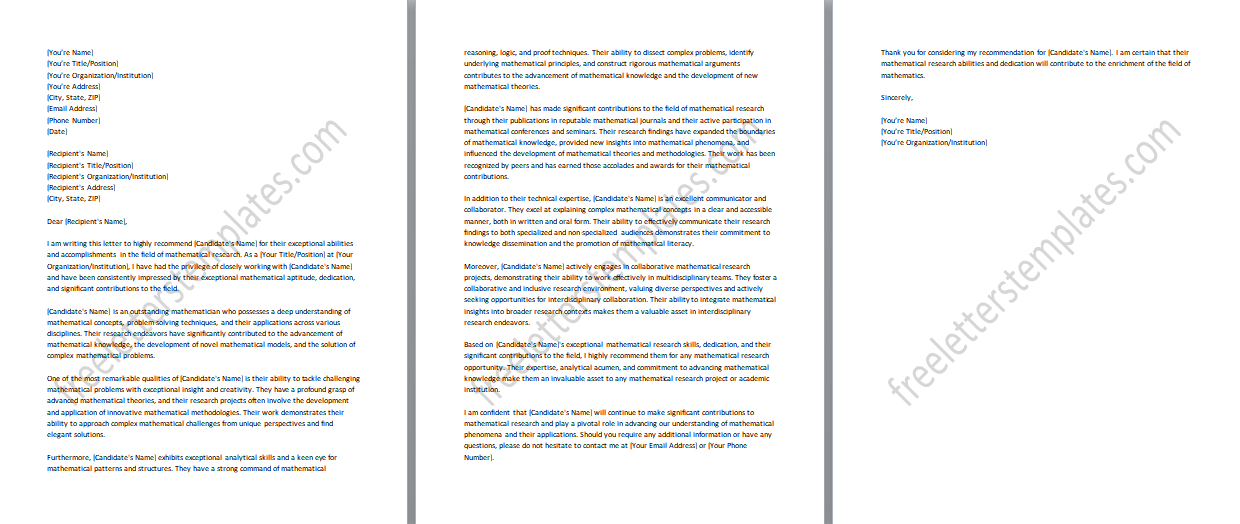
#19: Pharmaceutical Research Endorsement
A pharmaceutical research endorsement letter provides validation and support for an individual’s expertise and contributions in the field of pharmaceutical research. It emphasizes their skills in conducting drug discovery and development studies, analyzing drug efficacy and safety, and contributing to advancements in pharmaceutical science. The letter highlights their ability to design and execute research protocols, collect and interpret data, and contribute to the development of novel therapies or pharmaceutical products. It showcases their knowledge of pharmaceutical regulations, their proficiency in laboratory techniques, and their commitment to improving patient outcomes. This endorsement letter serves as evidence of their competence in pharmaceuticals and can significantly enhance their credibility when applying for grants, academic positions, or collaborations in the field of pharmaceutical sciences.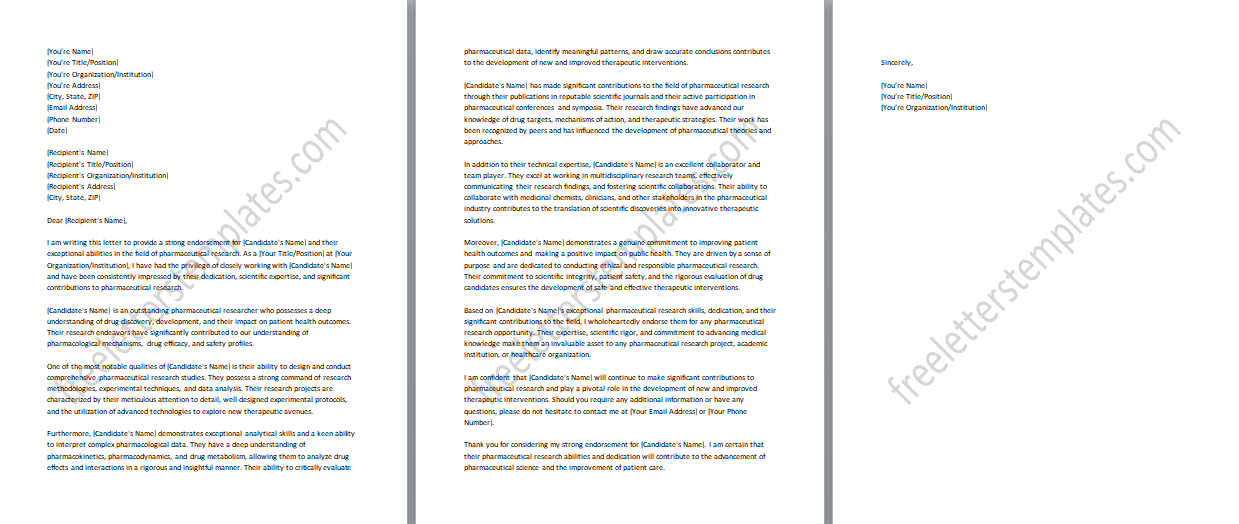
#20: Astrophysical Research Reference
An astrophysical research reference letter provides validation and support for an individual’s expertise and contributions in the field of astrophysical research. It emphasizes their skills in studying celestial objects, analyzing astronomical data, and making significant discoveries in the field of astrophysics. The letter highlights their ability to conduct observational or theoretical, interpret complex astrophysical phenomena, and contribute to the advancement of our understanding of the universe. It showcases their proficiency in using advanced telescopes, data analysis techniques, and mathematical modeling. This reference letter serves as evidence of their competence in astrophysical and can significantly enhance their credibility when applying for academic positions, research grants, or collaborations in the field of astrophysics.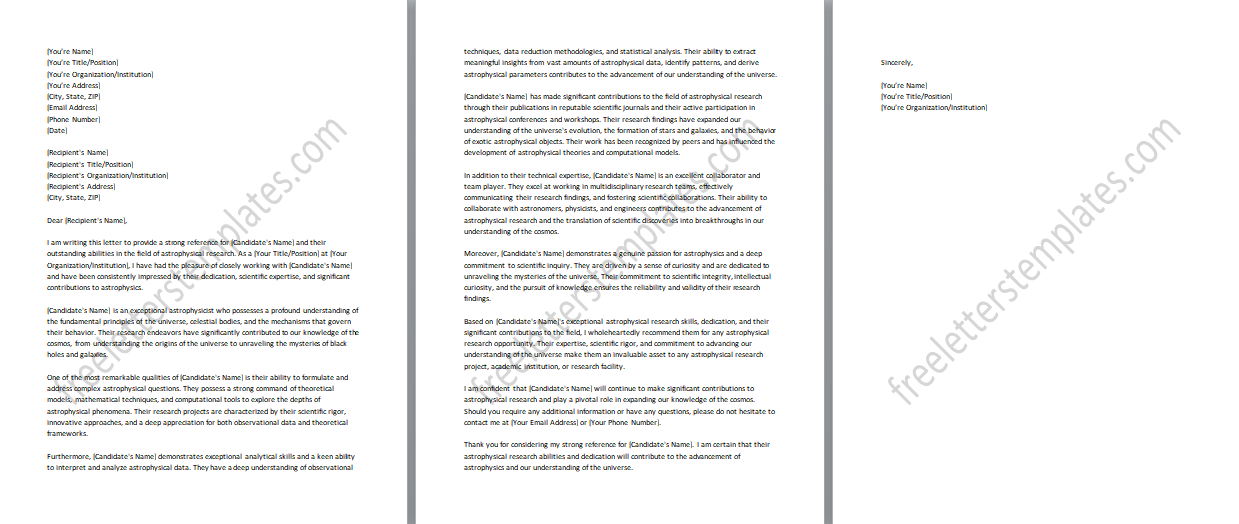
#21: Agricultural Research Recommendation
An agricultural research recommendation letter provides endorsement and support for an individual’s expertise and contributions in the field of agricultural research. It highlights their skills in conducting related to crop production, soil science, pest management, or agricultural sustainability. The letter emphasizes their ability to design and execute experiments, analyze data, and draw meaningful conclusions to address challenges in agriculture. It showcases their knowledge of agricultural practices, their proficiency in implementing innovative techniques, and their commitment to enhancing food security and sustainability.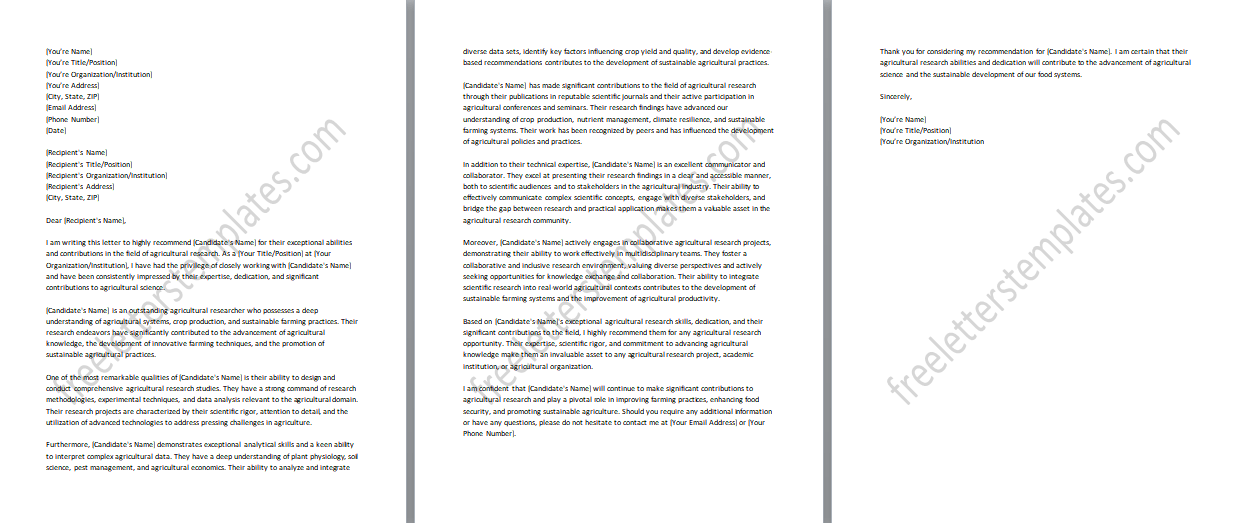
#22: Psychology Research Endorsement
A psychology research endorsement letter provides validation and support for an individual’s expertise and contributions in the field of psychology research. It highlights their skills in conducting empirical studies, analyzing psychological data, and making significant contributions to the field of psychology. The letter emphasizes their ability to design studies, employ appropriate methodologies, and interpret findings to gain insights into human behavior and mental processes. It showcases their knowledge of psychological theories, their proficiency in statistical analysis, and their commitment to advancing knowledge in the field.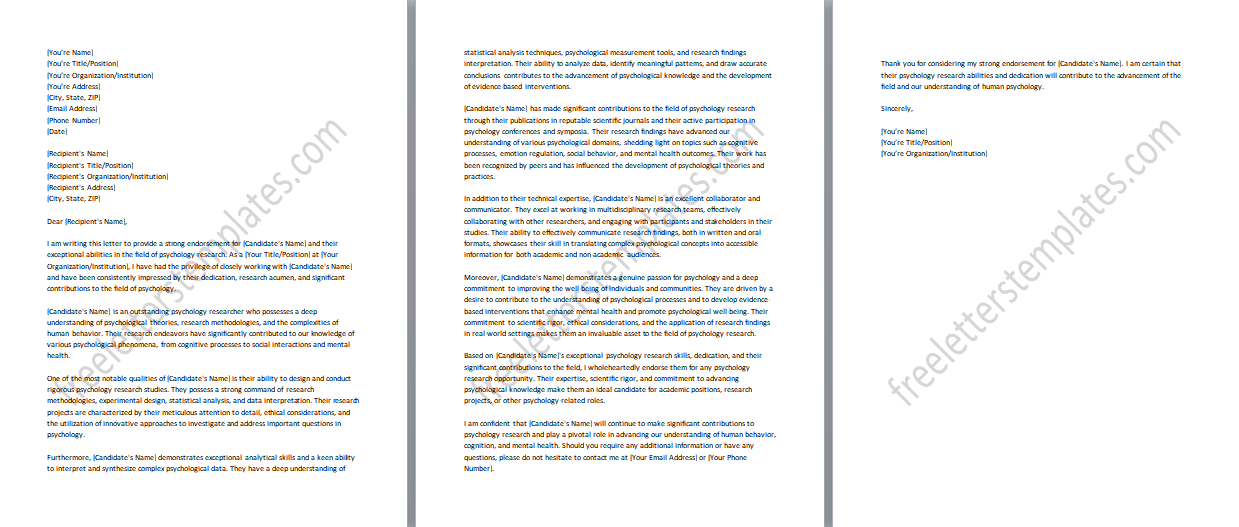
#23: Statistical Research Reference
A statistical research reference letter provides validation and support for an individual’s expertise and contributions in the field of statistical research. It emphasizes their skills in designing studies, analyzing data, and drawing meaningful conclusions using statistical methods. The letter highlights their ability to apply various statistical techniques, such as regression analysis, hypothesis testing, and data modeling, to address questions and solve complex problems. It showcases their proficiency in statistical software, their knowledge of advanced statistical methodologies, and their commitment to producing accurate and reliable results.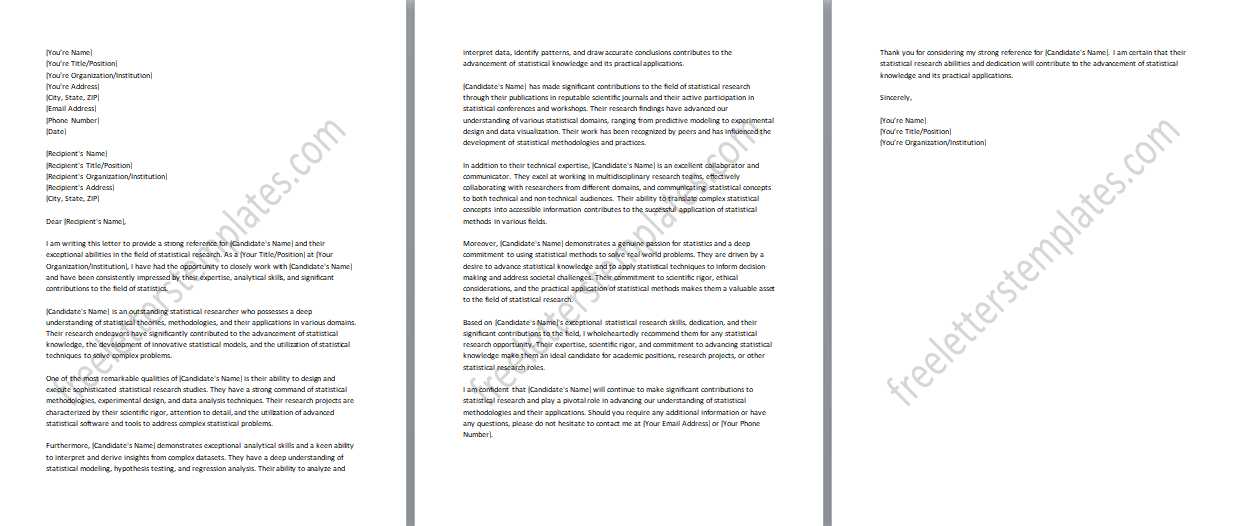
#24: Public Health Research Commendation
A public health research commendation letter recognizes and praises an individual’s exceptional achievements and contributions in the field of public health research. It highlights their skills in conducting, analyzing data, and translating findings into actionable recommendations for public health interventions and policies. It showcases their knowledge of public health principles, their proficiency in statistical analysis, and their commitment to improving population health outcomes. This commendation letter acknowledges their outstanding work in public health and their potential for making significant contributions to public health initiatives and policies.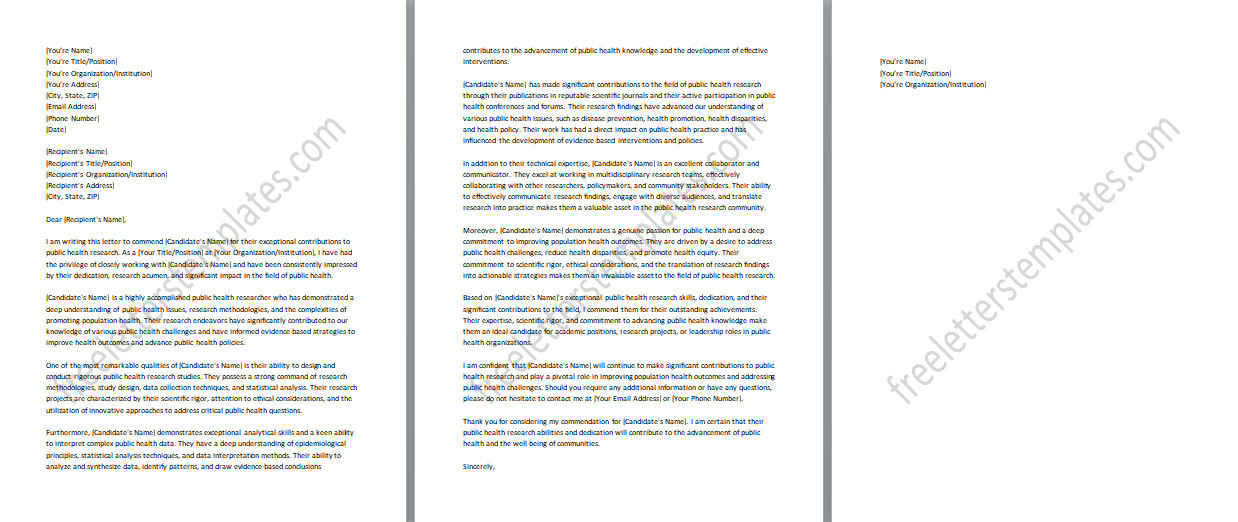
#25: Urban Planning Research Recommendation
An urban planning research recommendation letter provides endorsement and support for an individual’s expertise and contributions in the field of urban planning research. It highlights their skills in conducting urban development, analyzing urban systems, and making significant contributions to the field of urban planning. The letter emphasizes their ability to analyze spatial data, assess the social and environmental impacts of urban development, and propose sustainable solutions for urban challenges. It showcases their knowledge of urban planning theories, their proficiency in utilizing geographic information systems (GIS), and their commitment to creating livable and resilient cities.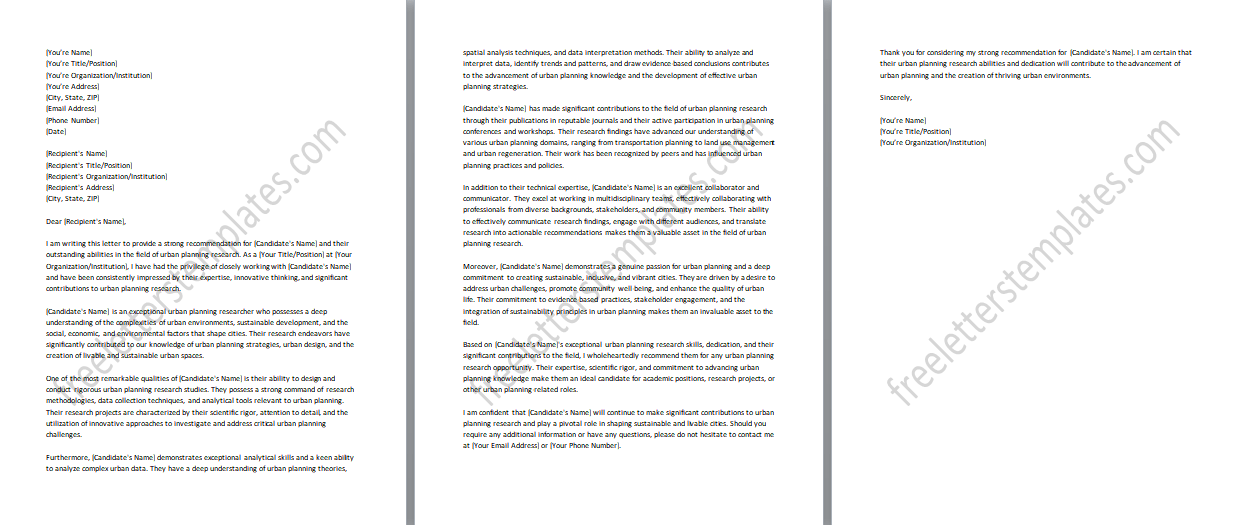
#26: Artistic Research Endorsement
An artistic research endorsement letter provides validation and support for an individual’s expertise and contributions in the field of artistic research. It emphasizes their skills in conducting within the artistic domain, exploring new creative methodologies, and making significant contributions to the field of arts. The letter highlights their ability to integrate theoretical and practical approaches, challenge traditional artistic boundaries, and generate innovative artistic expressions. It showcases their knowledge of artistic theories, their proficiency in various artistic mediums, and their commitment to pushing the boundaries of artistic practices.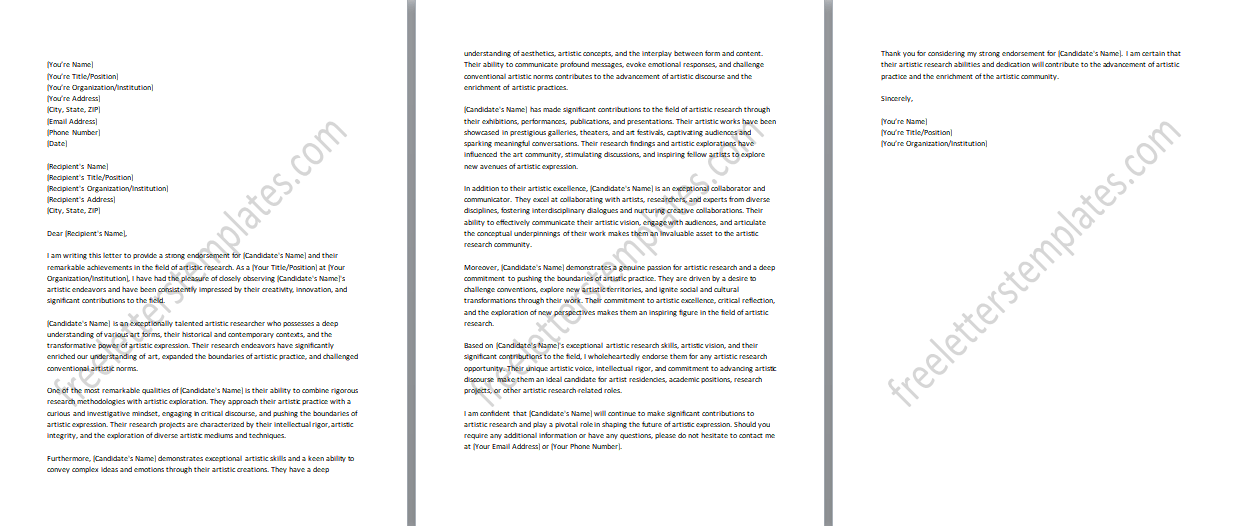
#27: Communication Research Reference
A communication research reference letter provides validation and support for an individual’s expertise and contributions in the field of communication research. It emphasizes their skills in conducting various communication phenomena, analyzing communication processes, and making significant contributions to the field of communication studies. The letter highlights their ability to employ qualitative and quantitative methods, conduct surveys or interviews, and analyze media content or interpersonal interactions. It showcases their knowledge of communication theories, their proficiency in data analysis, and their commitment to advancing our understanding of communication dynamics.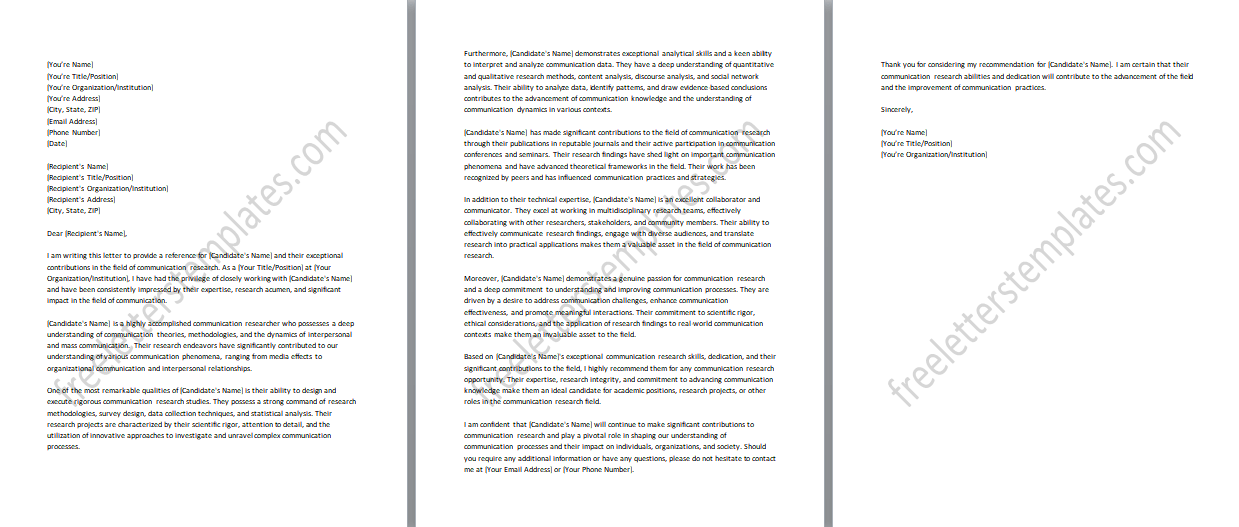
#28: Geographical Research Recommendation
A geographical research recommendation letter provides endorsement and support for an individual’s expertise and contributions in the field of geographical research. It emphasizes their skills in studying the Earth’s physical features, analyzing spatial data, and making significant contributions to the field of geography. The letter highlights their ability to conduct fieldwork, employ advanced geospatial technologies, and interpret geographic patterns and processes. It showcases their knowledge of geographical theories, their proficiency in data analysis and mapping, and their commitment to understanding the interactions between humans and their environment.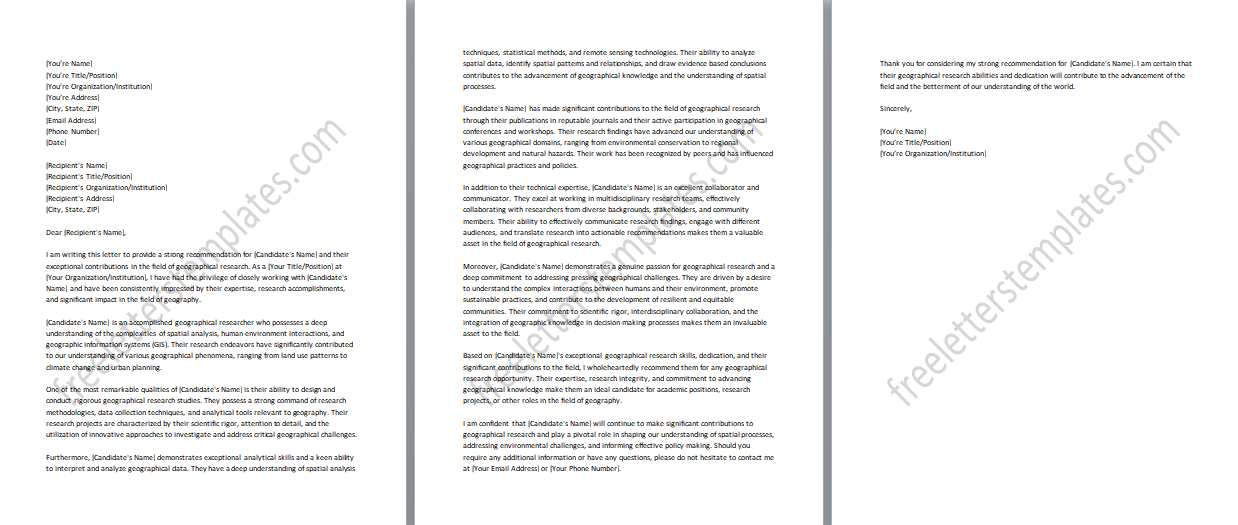
Impactful Language and Phrases
Here are some impactful language and phrases that can effectively communicate your qualifications, achievements, and research contributions in your research reference letters:
- Qualifications and Expertise:
- “Demonstrates exceptional knowledge and expertise in…”
- “Possesses a deep understanding of…”
- “Displays a strong command of the subject matter…”
- “Shows remarkable proficiency in…”
- Accomplishments and Contributions:
- “Made significant contributions to the field of…”
- “Achieved remarkable milestones in…”
- “Published groundbreaking research papers on…”
- “Received accolades and awards for exceptional work in…”
- Research Skills and Methodologies:
- “Exhibits exceptional skills, utilizing both qualitative and quantitative methodologies.”
- “Demonstrates a keen ability to design and implement rigorous experiments and studies.”
- “Excels in data analysis, employing advanced statistical techniques and modeling approaches.”
- “Expertly applies cutting-edge research techniques and technologies in the field of…”
- Collaboration and Leadership:
- “Collaborates seamlessly with interdisciplinary teams, fostering a synergistic research environment.”
- “Provides strong leadership in projects, effectively guiding and motivating team members.”
- “Effectively communicates findings to diverse audiences, both orally and in written form.”
- “Mentors and inspires fellow researchers, fostering a culture of innovation and excellence.”
- Impact and Significance:
- “Has made a profound impact on the field of… through groundbreaking discoveries.”
- “Research findings have led to significant advancements in…”
- “Work has been instrumental in shaping the current understanding of…”
- “Research has direct implications for real-world applications in…”
- Intellectual Curiosity and Critical Thinking:
- “Displays an insatiable intellectual curiosity, constantly seeking innovative questions.”
- “Approaches challenges with a high degree of critical thinking and analytical rigor.”
- “Demonstrates exceptional problem-solving abilities, identifying novel solutions to complex issues.”
- “Continuously pushes the boundaries of knowledge through a relentless pursuit of academic excellence.”
Resources and Tools
- Letter Templates: Offer a collection of professionally crafted letter templates for different research disciplines, including academic research, industry, scientific, and more. These templates can serve as a starting point for individuals to structure their letters and ensure they include the necessary information.
- Writing Guides: Provide comprehensive writing guides that offer step-by-step instructions on how to write effective research reference letters. Cover topics such as the appropriate tone, content organization, and key elements to include in the letter. Include tips on how to highlight the individual’s skills, accomplishments, and potential impact persuasively.
- Sample Letters: Showcase sample reference letters that have been anonymized and approved for sharing. These examples can serve as inspiration for individuals to understand the overall structure, language, and formatting conventions of a strong reference letter.
- Citation Formats: Include guidelines and resources for proper citation formats commonly used in research reference letters. Provide information on citation styles such as APA, MLA, or Chicago style, and offer links to online citation generators or style guides for easy reference.
- Proofreading and Editing Tools: Recommend online tools or software that can assist individuals in proofreading and editing their reference letters. These tools can help catch spelling and grammar errors, suggest improvements in sentence structure and clarity, and ensure overall coherence in the letter.
- FAQs and Tips: Address frequently asked questions related to reference letter writing, such as common mistakes to avoid, strategies for emphasizing skills, and advice on how to make the letter stand out. Provide practical tips and insights from experts in the field.
- Workshops or Webinars: Consider hosting virtual workshops or webinars focused on research reference letter writing. Invite guest speakers, such as professors or industry professionals, to share their expertise and provide valuable insights and advice.
Choose the Right Referees:
Selecting the appropriate referees is crucial to ensure that your research reference letters carry weight and credibility. Here are some tips to consider:
- Familiarity with Your Work: Choose referees who are familiar with your academic or professional accomplishments. They should have direct knowledge of your work, methodologies, and the impact of your research.
- Expertise in the Specific Research Area: Look for referees who have expertise and experience in the specific area you are involved in. They should be well-versed in the theories, methodologies, and advancements relevant to their field of research.
- Academic and Professional Standing: Consider professors, supervisors, or industry professionals who hold respectable positions in their respective fields. Their reputation and credibility will enhance the value of the reference letter.
- Depth of Interaction: Prioritize referees with whom you have had significant interaction, such as research collaborations, coursework, or supervised projects. Their letters will carry more weight as they can provide detailed insights into your abilities, work ethic, and potential.
- Positive Relationship: Choose referees with whom you share a positive and professional relationship. They should be supportive of your goals and willing to advocate for your capabilities and achievements.
- Balance of Perspectives: If possible, consider having a mix of referees from different perspectives, such as academic and industry. This can provide a well-rounded assessment of your research skills and potential.
- Current and Active Referees: Select referees who are currently active in their fields and can provide up-to-date insights into the landscape. Their recent experiences and knowledge will enhance the relevance of their recommendations.
Concluding Thoughts
In conclusion, we prioritize the privacy and confidentiality of our user’s personal information and research reference letters. We are committed to complying with applicable data protection regulations and handling all information securely. Our privacy policy outlines the types of information we collect, how we use and store it, and our commitment to not sharing or selling personal information without explicit consent. We treat all reference letters and accompanying documents as confidential, sharing them only with authorized recipients as directed by the user. We maintain strict data security measures, including encryption and access controls, to safeguard the information entrusted to us. We strive to provide a trustworthy and secure platform for individuals seeking reference letters, ensuring that their privacy is protected every step of the way.